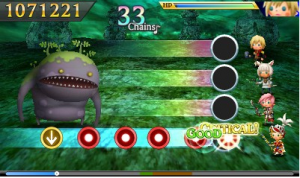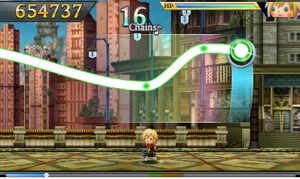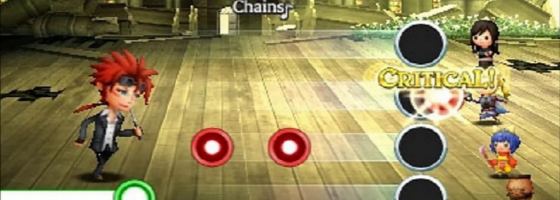Continuing Square-Enix’s spreading of the Final Fantasy brand, the Final Fantasy Theatrhythm series combined rhythm based gameplay with RPG progression and battles while showcases the series’ amazing soundtracks over the decades. Now that Curtain Call has a sequel with Final Fantasy Theatrhythm Curtain Call, the developers have yet another strange musical journey for fans.
A Combat Quartet:
The story of Curtain Call… yeah I’m not going to try and explain it as I’m still hung up on trying to say the word “Theatrhythm.” Basically good and evil are fighting again and it’s up to the heroes of all the Final Fantasy games to come together to save the world, which this time means fighting musical battles among other things.
The gameplay of Curtain Call is the same basic rhythm system that we’ve seen in titles like Elite Beat Agents: Beats will enter the screen from left to right and you need to time your button presses when they reach the points on the right side of the screen. Advanced notes will require you to slide either the stylus or circle pad to keep within the path until the note ends. Every miss will drain health and running out before the song ends means you lose.
Levels are based on Final Fantasy soundtracks from all the previous games and that alone may be enough for fans of the series. There are several types of levels — Battles where you’ll fight enemies with your party assembled classic Final Fantasy style, travel where you’ll be moving and emotional where you’ll watch clips of cut scenes. This is all done in a cartoon like style that helps tie all the different characters, aesthetics and games together into Curtain Call.
And if that was enough, Curtain Call would be a decent take on rhythm game design, but the developers have a lot more under their sleeves.
Musical RPG:
What makes the Theatrhythm series so interesting is that there is an entire RPG layer under the music which will affect your progress. Every character in the game has stats like luck, stamina, strength etc as you would see in a RPG. This in turn will affect them during the different events. For instead during a battle event, characters with high strength will do more damage on successful beat timing which will kill monsters quicker and give you a chance to get more loot.

FinalFantasyTheaterhythm Curtain Call combines classic Final Fantasy characters and combat, but frames it in musical based gameplay.
While having higher stamina is key for the travel events as you are rewarded the further you get which your speed is dependent on how well you time your beats.
And there is also an upgrade system where you can use cards that represent famous characters to enhance stats, special abilities to equip and there is just a lot going on under the hood.
Curtain Call’s progression is built on completing songs and getting RP or rhythmia points. As you hit certain thresholds you’ll unlock new characters, songs and game modes. One game mode: Quest Medley is essentially a RPG quest where you’ll have to complete a series of songs that are framed on a game map while fighting bosses along the way. The mode does take a lot of time but you can take a break whenever.
There really is just a lot of content in Curtain Call and for Final Fantasy fans; it’s definitely a treat to go down memory lane. However while there is a lot of content, there isn’t a lot of new content which hurts the game.
Throwing Tomatoes:
Final Fantasy Theaterhythm Curtain Call beat timing gameplay is basic when you put it next to the cult hit Elite Beat Agents. There are no spinners, back and forth beats or any real storytelling that the music impacts. The music and what’s going on in the background are completely separated from each other with exception to a few moments on each song. Playing on the highest difficulty (Ultimate) there were times where the little graphical effects were distracting me from the beats.

Following paths with the circlepad is okay, but you can have trouble when you have to match a direction at the end.
While there are over 200 songs in the game, there are really only three game modes that affect what you’ll be doing in them. This makes the game very repetitive despite all the RPG layering there is.
And the RPG mechanics are so thinly there that it’s hard to tell if they’re actually making a difference. It would have been a good pairing to have the stats matter during the RPG mode for bonuses or secrets to give them more value.
I also have to complain about the controls with one type of beat matching. During sections where you have to hold down the button and follow a path using the circle pad, the game likes to throw an additional beat at the end where you have to input a direction. However if the direction is different than the path of the track, most of the time I would get penalized for still following the track before I could switch directions.
On the highest difficulty it’s less about being accurate and more about the fact that the beats are coming so fast that it can be hard to process them before they reach the market.
Taking a Bow:
The Theatrhythm series is an interesting change from traditional Final Fantasy game design and fans of the music of Final Fantasy will have a lot of fun listening to all the classic melodies. But the developers should have looked at the Elite Beat Agents series for ideas on how to evolve and challenge the player. There is plenty of content to keep you going, but depending on your play style, it’s hard to say if you’ll be engaged until the end.


